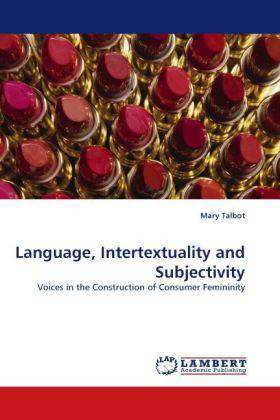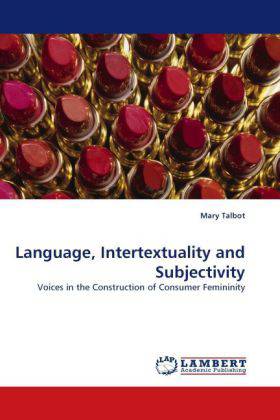
- Afhalen na 1 uur in een winkel met voorraad
- Gratis thuislevering in België vanaf € 30
- Ruim aanbod met 7 miljoen producten
- Afhalen na 1 uur in een winkel met voorraad
- Gratis thuislevering in België vanaf € 30
- Ruim aanbod met 7 miljoen producten
Zoeken
Language, Intertextuality and Subjectivity
Voices in the Construction of Consumer Femininity
Mary Talbot
Paperback | Engels
€ 67,45
+ 134 punten
Omschrijving
Women in industrialized societies have a lifelong relationship with consumerism. They are caught up in a 'consumer femininity', since a feminine identity involves, among other things, a particular mode of consumption. This study, presented in full for the first time in this volume, aims to stimulate critical awareness of consumer femininity. It culminates in sample analysis of a type of discourse that contributes to the formation of women as feminine subjects: the teen magazine. The book proposes an approach to doing critical discourse analysis that focuses on the constitution of a language user's subjectivity in the act of reading. Influenced by the early work of Norman Fairclough, it locates points of focus for taking up a critical (and specifically feminist) reading position in discourse analysis. In doing so, it seeks to provide theoretical and analytical grounding for a critical pedagogy that will take into the classroom attention to language and construction of language users' subjectivities.
Specificaties
Betrokkenen
- Auteur(s):
- Uitgeverij:
Inhoud
- Aantal bladzijden:
- 188
- Taal:
- Engels
Eigenschappen
- Productcode (EAN):
- 9783843358590
- Verschijningsdatum:
- 4/10/2010
- Uitvoering:
- Paperback
- Formaat:
- Trade paperback (VS)
- Afmetingen:
- 152 mm x 229 mm
- Gewicht:
- 281 g

Alleen bij Standaard Boekhandel
+ 134 punten op je klantenkaart van Standaard Boekhandel
Beoordelingen
We publiceren alleen reviews die voldoen aan de voorwaarden voor reviews. Bekijk onze voorwaarden voor reviews.











